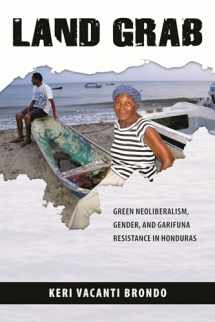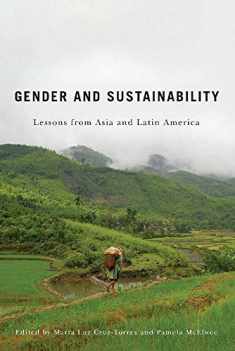
Land Grab: Green Neoliberalism, Gender, and Garifuna Resistance in Honduras
ISBN-13:
9780816530212
ISBN-10:
0816530211
Edition:
First Edition
Author:
Keri Vacanti Brondo
Publication date:
2013
Publisher:
University of Arizona Press
Format:
Hardcover
248 pages
Category:
Cultural
,
Anthropology
FREE US shipping
Book details
ISBN-13:
9780816530212
ISBN-10:
0816530211
Edition:
First Edition
Author:
Keri Vacanti Brondo
Publication date:
2013
Publisher:
University of Arizona Press
Format:
Hardcover
248 pages
Category:
Cultural
,
Anthropology
Summary
Land Grab: Green Neoliberalism, Gender, and Garifuna Resistance in Honduras (ISBN-13: 9780816530212 and ISBN-10: 0816530211), written by authors
Keri Vacanti Brondo, was published by University of Arizona Press in 2013.
With an overall rating of 3.8 stars, it's a notable title among other
Cultural
(Anthropology) books. You can easily purchase or rent Land Grab: Green Neoliberalism, Gender, and Garifuna Resistance in Honduras (Hardcover) from BooksRun,
along with many other new and used
Cultural
books
and textbooks.
And, if you're looking to sell your copy, our current buyback offer is $0.3.
Description
Land Grab is a rich ethnographic account of the relationship between identity politics, neoliberal development policy, and rights to resource management in Garifuna communities on the north coast of Honduras, before and after the 2009 coup d’état. The Garifuna are a people of African and Amerindian descent who were exiled to Honduras from the British colony of St. Vincent in 1797 and have long suffered from racial and cultural marginalization.
Employing approaches from feminist political ecology, critical race studies, and ethnic studies,Keri Vacanti Brondo illuminates three contemporary development paradoxes in Honduras: the recognition of the rights of indigenous people at the same time as Garifuna are being displaced in the name of development; the privileging of foreign research tourists in projects that promote ecotourism but result in restricting Garifuna from traditional livelihoods; and the contradictions in Garifuna land-rights claims based on native status when mestizos are reserving rights to resources as natives themselves.
Brondo’s book asks a larger question: can “freedom,” understood as well-being, be achieved under the structures of neoliberalism? Grounding this question in the context of Garifuna relationships to territorial control and self-determination, the author explores the “reregulation” of Garifuna land; “neoliberal conservation” strategies like ecotourism, research tourism, and “voluntourism;” the significant issue of who controls access to property and natural resources; and the rights of women, who have been harshly impacted by “development.” In her conclusion, Brondo points to hopeful signs in the emergence of transnational indigenous, environmental, and feminist organizations.
Employing approaches from feminist political ecology, critical race studies, and ethnic studies,Keri Vacanti Brondo illuminates three contemporary development paradoxes in Honduras: the recognition of the rights of indigenous people at the same time as Garifuna are being displaced in the name of development; the privileging of foreign research tourists in projects that promote ecotourism but result in restricting Garifuna from traditional livelihoods; and the contradictions in Garifuna land-rights claims based on native status when mestizos are reserving rights to resources as natives themselves.
Brondo’s book asks a larger question: can “freedom,” understood as well-being, be achieved under the structures of neoliberalism? Grounding this question in the context of Garifuna relationships to territorial control and self-determination, the author explores the “reregulation” of Garifuna land; “neoliberal conservation” strategies like ecotourism, research tourism, and “voluntourism;” the significant issue of who controls access to property and natural resources; and the rights of women, who have been harshly impacted by “development.” In her conclusion, Brondo points to hopeful signs in the emergence of transnational indigenous, environmental, and feminist organizations.


We would LOVE it if you could help us and other readers by reviewing the book
Book review

Congratulations! We have received your book review.
{user}
{createdAt}
by {truncated_author}



